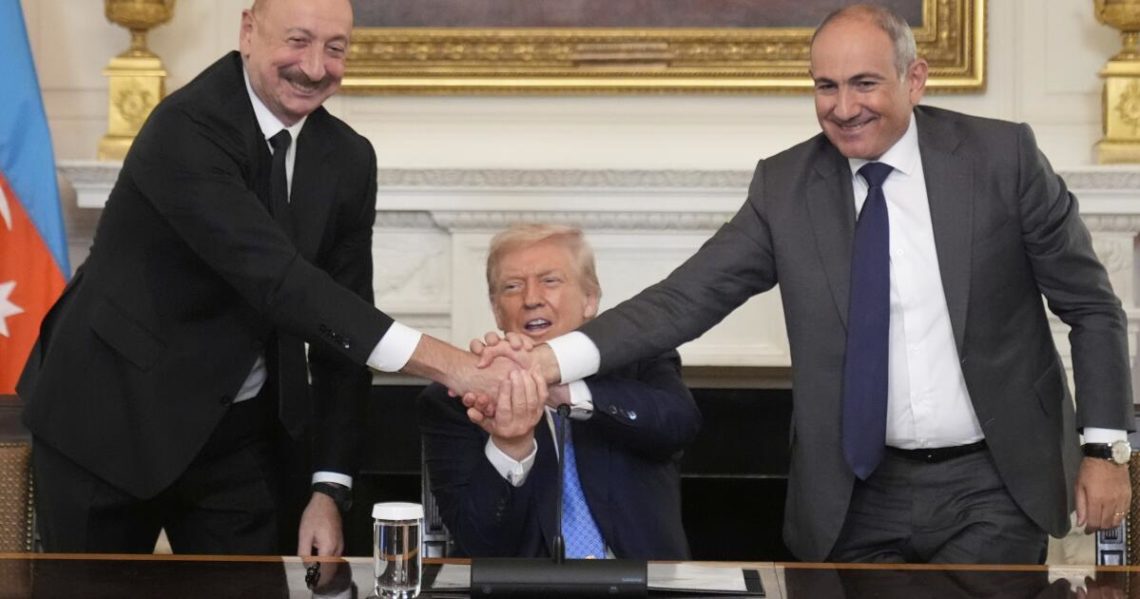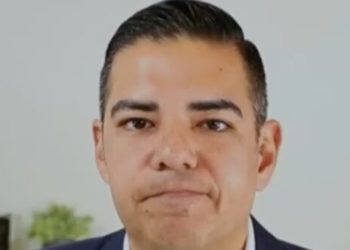On Aug. 8, as the White House hosted the trilateral signing of a peace agreement between Armenia, Azerbaijan and the United States, I spoke to a group of Armenian high school students from Los Angeles. We paused to watch the news conference on a laptop in the corner of our crowded room. Their faces — curious, cautious and skeptical — mirrored a sentiment across the Armenian diaspora: hope tempered by doubt, pride shadowed by mistrust.
This conflict’s roots run deep. After the Soviet Union collapsed, Armenia and Azerbaijan fought a brutal war over a region within Azerbaijan’s borders but claimed by both nations. Azerbaijanis call it Nagorno-Karabakh; Armenians call it Artsakh. A ceasefire held for years but left core disputes unresolved — over territory, governance and the right of self-determination for the region’s Armenian population.
War erupted again in 2020. Backed by Turkey and armed with advanced weapons, Azerbaijan gained control of much of the disputed territory. The Trump administration did nothing to meaningfully intervene. For Armenians, it was a devastating loss — of land, security, trust and cultural heritage. For Azerbaijan, it was a political and military victory that shifted the balance of power.
In December 2022, Azerbaijan launched a blockade of the Lachin corridor — the only road linking Nagorno-Karabakh/Artsakh to Armenia — tightening its grip on a region already reeling from war. For the next 10 months, gas, electricity, internet, food and medicine were cut off to 120,000 Armenians, many of them children and elderly. Families rationed bread. Surgeries were postponed. Schools closed.
I visited the region during this time and stood at the Armenian end of the corridor, where a silent convoy of trucks stretched out of sight up the road — each loaded with food, medicine and basic supplies, each driver knowing they might never be allowed to deliver them. The air was heavy with frustration and helplessness. In the limited coverage of the siege, the isolated Armenians spoke in hushed tones, their faces drawn from months of fear and deprivation. The International Court of Justice ordered Azerbaijan to reopen the corridor, but Baku ignored it.
I took pride when President Biden officially recognized the Armenian genocide — a moral milestone decades overdue. But his administration failed to punish Azerbaijan during the blockade, and it failed to prevent what came next: Azerbaijan’s full-scale military assault on Nagorno-Karabakh/Artsakh in September 2023. The attack lasted just 24 hours but forced more than 100,000 ethnic Armenians — virtually the entire population of the region — to flee their homes. Centuries-old communities were emptied almost overnight, and families left behind homes, businesses and places of worship, uncertain if they would ever return.
I’ve felt conflicted watching the Trump administration’s peace-making efforts between Armenia and Azerbaijan. On one hand, I love seeing my country, the United States, stand with Armenia and prioritize Armenian issues on the world stage. On the other, this moment feels hollow. And to me, this reflects a deeper problem: U.S. policy toward the South Caucasus has long lacked consistency, accountability and the will to confront aggressors, no matter which party is in power. And in Washington, Armenians have few friends and weak representation.
This agreement — like much of U.S. foreign policy in the current administration — is unmistakably transactional. Armenia gains U.S. security assurances and cooperation on artificial intelligence, including support for an emerging AI hub, which is meant to anchor its Western trajectory. Azerbaijan walks away with de facto immunity instead of being held accountable for its actions against the Armenians of Artsakh, as well as arms sales and a transit corridor to Turkey. The United States gets a geopolitical trophy: Trump’s name on the corridor to Turkey, leverage in the region and an apparent diplomatic “win” to market at home.
But this deal is far from complete. It omits the right of return for displaced Armenians to Artsakh, ignores the destruction of Armenians’ towns, homes and businesses, makes no commitment to preserve Artsakh’s cultural heritage and says nothing about prisoners of war. For many in the Armenian diaspora, these are glaring and unacceptable omissions.
On paper, the newly named Trump Route for International Peace and Prosperity, the link from Azerbaijan to Turkey, is billed as a neutral, cooperative route to be administered by the U.S. In reality, it raises serious questions about Armenia’s sovereignty. The corridor will run through Armenia’s southern Syunik province — its only direct land link to Iran — and could weaken Yerevan’s ability to fully control its own borders, regulate trade and ensure unimpeded access to a vital southern lifeline.
At best, the Aug. 8 agreement offers a slim hope for a real resolution of the region’s conflicts. If implemented fully, it could help build a more stable and prosperous Armenia for future generations. The challenge is in ensuring this deal yields a U.S. investment in reconstruction, accountability and lasting security, something more than a photo op.
And even incomplete, flawed agreements can create openings. Armenia’s pivot West, which the deal underlines, carries risk, but it also offers the possibility of stronger security partnerships, economic renewal and cultural preservation, if those benefits reach the people who have endured war and blockade, not just the leaders who signed the papers. In recent years, Armenia has seen a surprising economic boom, driven by tech investment, tourism and a wave of returning diaspora talent. This fragile momentum could be strengthened or squandered depending on what comes next.
I respect President Trump for pursuing peace agreements — leaders everywhere should make peace their highest priority. The Armenian American students I met on Aug. 8, who carry the inherited pain of their parents and grandparents, deserve more than symbolic gestures or transactional deals. They deserve justice and the freedom to envision a better future for their ancestors’ homeland. Ultimately, that is the hope we all share.
Jirair Ratevosian served as senior policy advisor for the State Department in the Biden administration.
The post Contributor: Armenians deserve more than a transactional peace deal with Azerbaijan appeared first on Los Angeles Times.




